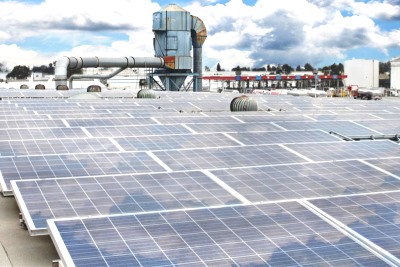
Green Initiative
The flexible packaging industry has recognized environmental considerations for some time. A key advantage often promoted is its eco-friendliness compared to metal cans and glass containers in various applications. Choosing flexible packaging instead of rigid containers offers a strong argument for environmental sustainability. Flexible packaging, typically crafted from lightweight materials such as plastic or foil, demands less energy for both production and transportation when compared to glass. This lighter weight results in reduced carbon emissions during transit, thereby promoting an eco-friendlier supply chain. Moreover, flexible packaging generally occupies less space than rigid containers, enhancing shipping efficiency and further decreasing environmental harm. Flexible packaging offers significant environmental advantages over rigid containers, including reduced energy consumption, lower carbon emissions, and enhanced shipping efficiency.

Solar Panel Installation
Understanding its responsibility to the environment, IMPAK Corporation recently completed a large solar panel project to generate clean, sustainable energy at their Los Angeles facility at 13700 S. Broadway.
In a board meeting last year, IMPAK Corporation renewed its commitment to the environment by launching a 228 panel 51.3kw solar panel project. When asked about the motivation behind the project the General Manager of IMPAK Corporation stated "a business our size has an indelible responsibility to the community it resides in and the environment. Going solar not only reduces our dependency on carbon fuels, but also offsets much of our overhead and enables us to offer our products at more competitive rates."

Solar Energy Inverters
IMPAK’s corporate office is powered by this bank of awesome solar power inverters, capable of supplying a constant stream of electricity to both the administrative areas and our huge warehouse.
Power inverters are critically important to any solar powered operation. Inverters themselves don’t produce any power. Electricity coming from our rooftop solar panels is direct current (DC).
The circuitry inside our inverters changes the incoming DC power to the alternating current (AC) we need to power our offices.

Drought-tolerant Landscaping
In March 2014 we did a complete redesign of our front landscaping adopting a drought-tolerant theme. In an effort to avoid using harmful chemicals that cause environmental pollution, we have used NO chemicals to remove existing vegetations, and the weeds were plucked only by hands. The plants that are installed in the new garden are carefully selected, and are all drought-tolerant plants requiring minimum usage of water. About 50% of water for irrigation is wasted due to evaporation, wind, or run-off due to inefficient irrigation system. 99% of our irrigation is efficient drip irrigation. In the garden, you see two dry river beds on both sides of the entrance. These artificial formations of stones and rivers simulating a dry river bed will not only collect water during the rainy season, but they also help to prevent water run-off to the street.
As part of the new landscaping project, we installed a new bike rack that holds up to 4 bikes. The U.S. Energy Information Administration reports that on average, an average car emits 20lbs of CO2 per gallon. Since we installed this new bike rack, two of our employees who both live more than 20 miles away from our office started riding bicycles on a regular basis. This helps reduce the CO2 emission in the air by almost 50lbs per DAY.

Reducing Energy Demands
There are 16 lights at the entrance of our building. When we first moved in to this building a few years ago, these light bulbs stayed on all night on a timer which the previous owner had set. We immediately noticed the wasteful light energy consumption in this area. The first step we took was to replace the light bulbs with CFL's, then we reduced the number of lights from 16 to 6 while maintaining the aesthetic of the area by selecting those light bulbs in an orderly manner.

Reducing Office Waste
We encourage all our employees to reduce waste and recycle. Currently we have 4 recycle bins throughout our building. Each of these recycling bins gets full after 30 days, and the contents of the bottles are taken to the recycle center within 5 miles from our office, and are properly recycled.
